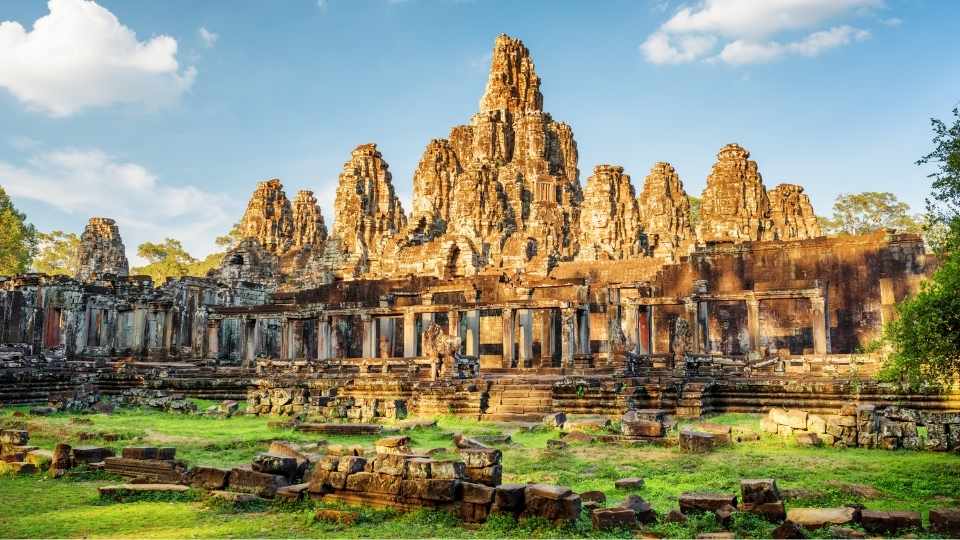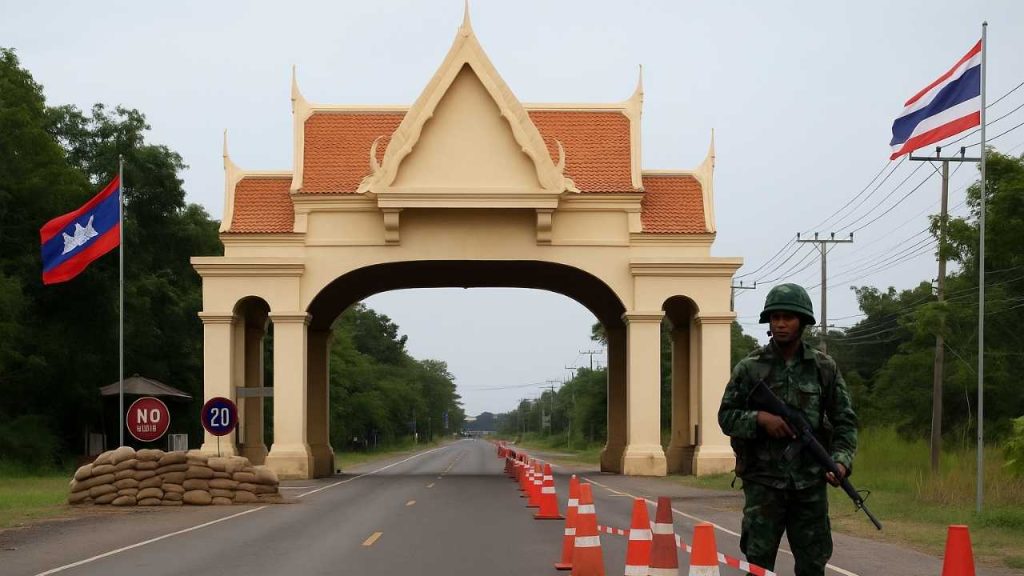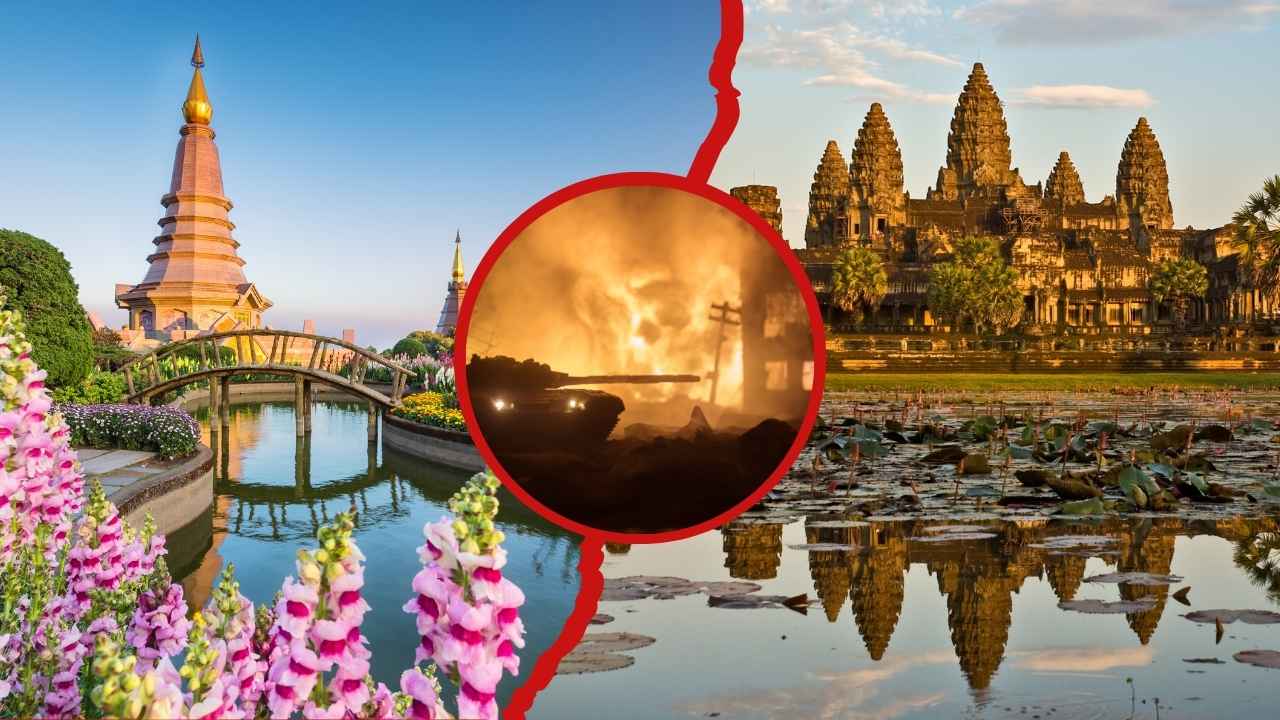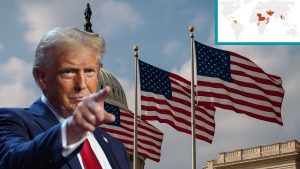As deadly border clashes between Thailand and Cambodia enter their third day, the Indian government has issued a Thailand-Cambodia conflict travel advisory urging Indian nationals to avoid specific provinces in Thailand due to ongoing violence. This comes after intense fighting in disputed border areas has left at least 32 people dead, displaced over 130,000 civilians, and sparked fears of a larger regional conflict.
According to the Indian Embassy in Thailand, seven provinces — Ubon Ratchathani, Surin, Sisaket, Buriram, Sa Kaeo, Chanthaburi, and Trat — are currently not recommended for travel. These areas, many of which lie close to the Cambodian border, have witnessed severe shelling, rocket attacks, and troop movements since hostilities erupted on July 23, 2025.
Table of Contents
Why This Conflict between Thailand & Cambodia?
The long-standing conflict between Thailand and Cambodia centers on the Preah Vihear Temple, an ancient Hindu Shiva Temple located near their shared border. Although the International Court of Justice awarded the temple to Cambodia in 1962, Thailand continues to dispute the surrounding 4.6 square kilometers of land. This unresolved territorial issue has sparked several violent clashes over the years, most notably between 2008 and 2011. Factors such as nationalist politics, conflicting historical maps, and the absence of clear border demarcation have continued to strain relations between the two Southeast Asian nations.
In the most recent flare-up in July 2025, tensions escalated following a landmine explosion near the disputed Prasat Ta Muen Thom temple, which injured several Thai soldiers. The incident led to retaliatory artillery and rocket fire from both sides. While some unverified reports and social media posts mentioned drone activity by Cambodian forces, there is no confirmed evidence linking drones to the start of the conflict.

Thailand-Cambodia Conflict Travel Advisory: What You Need to Know
On July 25, 2025, the Indian Embassy in Thailand released an advisory through its official X (formerly Twitter) handle, warning Indian nationals of the escalating violence near the border and attaching a list from the Tourism Authority of Thailand (TAT) identifying high-risk zones. The embassy urged travelers to consult official Thai sources such as the TAT Newsroom for real-time updates.
“In view of the situation near the Thailand-Cambodia border, all Indian travellers to Thailand are advised to check updates from Thai official sources, including TAT Newsroom,” the post read.
The warning follows a major flare-up of the long-standing border dispute between Thailand and Cambodia, previously dormant since a 2013 UN court resolution. Recent violence reportedly began after a landmine explosion injured Thai troops in a disputed area near the historic Prasat Ta Muen Thom temple complex, triggering retaliatory military action.

Escalation on the Ground
The conflict has now claimed over 30 lives, including civilians and children. According to reports from the Thai and Cambodian health ministries:
- 13 Cambodians have been killed
- 6 Thai soldiers and 13 civilians have died in Thailand
- Over 130,000 civilians have been displaced across both nations
Fighting has included artillery shelling, cross-border rocket attacks, and the use of BM-21 rocket launchers by Cambodian forces, prompting “supportive fire” responses from the Royal Thai Army. Several border checkpoints and national parks in the region have been shut down for public safety.
The Royal Thai Army confirmed engagements across four provinces, while airstrikes were launched on Cambodian territory in response to heavy artillery attacks.
Key Areas to Avoid
According to the Tourism Authority of Thailand, the following provinces are not recommended for travel at this time:
- Ubon Ratchathani
- Surin
- Sisaket
- Buriram
- Sa Kaeo
- Chanthaburi
- Trat
Within these provinces, specific danger zones include:
- Phanom Swai Forest Park
- Chong Sai Taku
- Chong Sa-ngam
- Ta Phraya National Park
Travelers are advised to stay away from forested border areas, avoid road travel near conflict zones, and register with their local embassy for emergency communication.
Political and Diplomatic Fallout
In a dramatic international response, U.S. President Donald Trump stated via Truth Social that he spoke to both Cambodian and Thai leaders, urging an immediate ceasefire.
“Thailand, like Cambodia, wants to have an immediate ceasefire and peace,” Trump posted, warning that no trade deal would be made with either nation unless hostilities cease.
This diplomatic push follows a deterioration in bilateral relations, with Thailand expelling Cambodia’s ambassador and recalling its own envoy after a Cambodian soldier was killed in May 2025 — a precursor to the current violence.
Impact on Tourism and Local Populations
Thailand’s Interior Ministry reported that over 100,000 Thai citizens have been affected, with town-wide evacuations in progress. The Tourism Authority of Thailand confirmed that multiple tourist attractions and routes in the affected provinces are now closed, and security agencies are actively monitoring the situation.
The Thai Health Ministry stated that at least 30 civilians and 15 soldiers have been injured so far. Relief operations are underway, but the risk of wider confrontation remains high, especially in disputed territories along the heavily forested border.
Is India’s Trade at Risk?
Despite growing trade relationships with both Thailand and Cambodia, India’s exports and imports remain largely unaffected at this stage. Trade continues via maritime routes, far removed from inland conflict zones.
According to TaxScan, India exported goods worth $5.06 billion to Thailand and imported $10.98 billion in FY 2023, primarily machinery, vehicles, and chemicals. Thailand ranks as India’s 4th-largest trading partner within ASEAN.
In contrast, trade with Cambodia is modest, with $192 million in exports (pharmaceuticals, vehicles, meat) and imports mostly comprising textiles and electronics. In 2024, Thailand accounted for $16.55 billion in bilateral trade with India, while Cambodia contributed only $404 million, or just 0.049% of India’s total trade.
Crucially, ports like Bangkok, Laem Chabang, and Sihanoukville remain unaffected, and Indian embassies in both countries have not reported any trade disruption. So far, India has not imposed or recommended any trade restrictions.
India’s Neutral Diplomatic Response
India has adopted a non-interventionist stance, consistent with its non-aligned foreign policy. The Ministry of External Affairs has not publicly commented on trade but has focused on citizen safety through travel advisories.
Embassies in both Thailand and Cambodia remain operational, and no diplomatic breakdown with either country has occurred from the Indian side.
What Indian Travelers Should Do Now
If you’re an Indian tourist currently in Thailand or planning a trip, here’s what you need to keep in mind:
✅ Avoid the 7 listed provinces entirely.
✅ Follow updates from the Indian Embassy in Thailand and TAT Newsroom.
✅ Register your presence with the Indian embassy if in the region.
✅ Avoid road travel, parks, and rural areas near the Cambodia border.
✅ Monitor flight or visa changes if any are announced due to emergency protocols.
India may issue further advisories depending on how the conflict unfolds in the coming days.
Related Sources: The Hindu, Newsonair.gov.in, NDTV, TV9
Dr. Suvankar Das is a scientific advisor by profession, associated with a CRO organization. He pursued his doctoral degree in Chemistry in 2015. Later, he worked as a postdoctoral researcher & scientist in a couple of institutes/companies.
Besides his scientific journey, Dr. Das is also a passionate traveler and travel blogger. He loves to share all his travel experiences with other travelers so that everyone can enjoy hassle-free holidays with their own tour plans.
He believes, the most beautiful thing in this world is the WORLD itself. so there is no way to live like a clock; rather live it like a compass!






